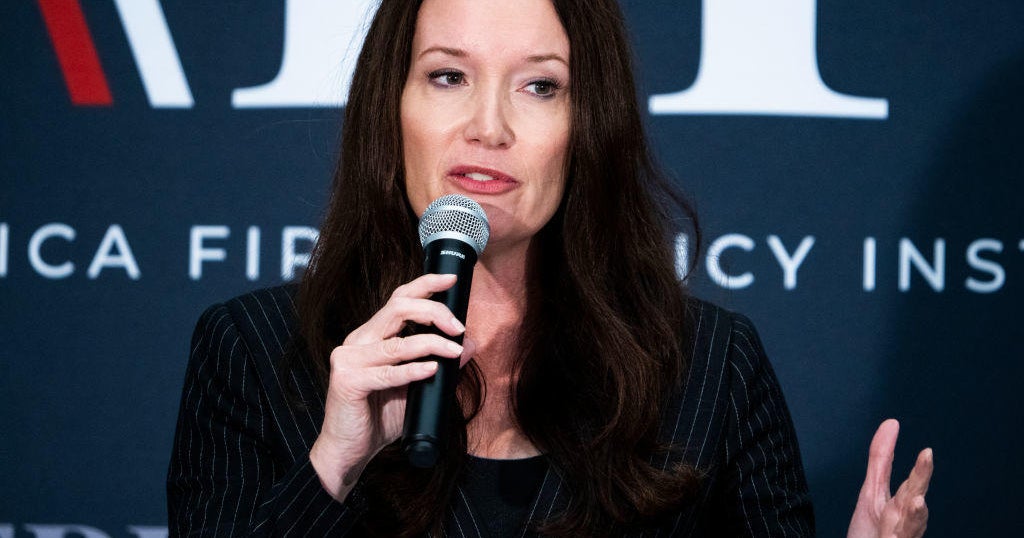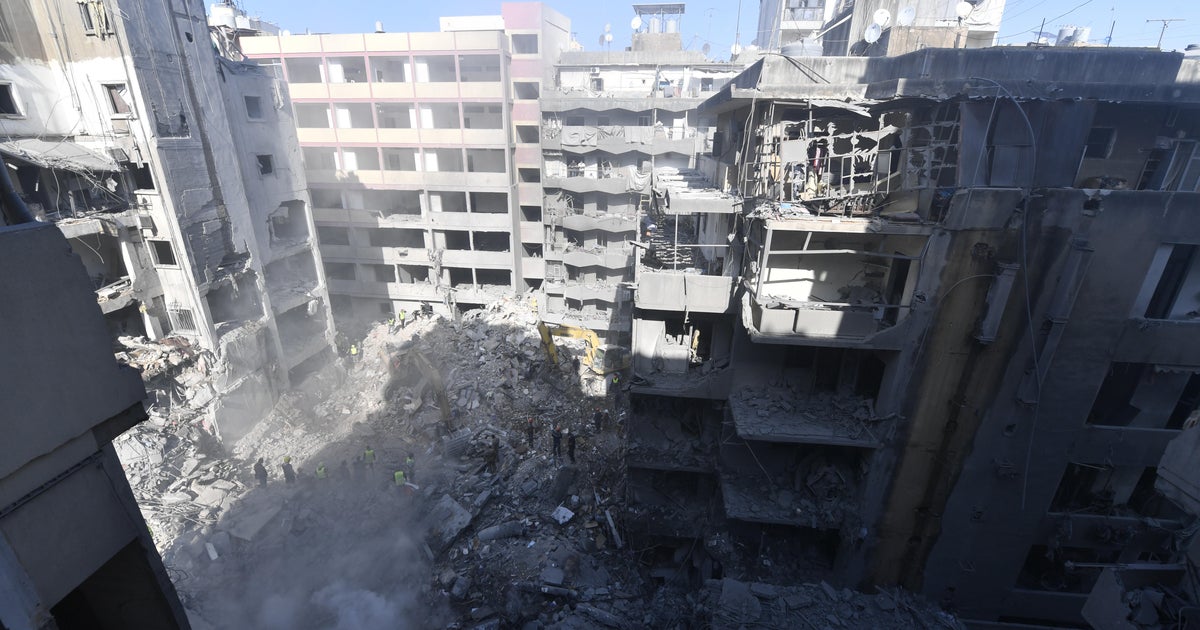CBS News
Israel’s war with Iran-backed Hezbollah escalates as IDF bombs financial institutions across Lebanon

A fresh wave of Israeli airstrikes started pounding locations across Lebanon on Sunday night, some striking dangerously close to Lebanon’s only international airport. Israel had said it would launch a widescale assault on a banking institution it regards as Hezbollah’s de-facto financial arm, the Al-Qard Al-Hassan Association.
The strikes began a day after a drone targeted Israeli Prime Minister Benjamin Netanyahu private residence in the central town of Caesarea. He and his wife weren’t there at the time and there were no casualties, but Netanyahu released a statement on Saturday saying, “the attempt by Iran’s proxy Hezbollah to assassinate me and my wife today was a grave mistake.”
Sunday night, explosions rocked Beirut as the Israeli strikes targeting Al-Qard al-Hassan began.
Ugur Yildirim/dia images/Getty
The Israel Defense Forces said in a statement Monday morning that the institution “directly funds Hezbollah’s terror activities, including the purchase weapons and payments to operatives.” The IDF said the Iran-backed, U.S. and Israeli-designated terrorist group has “billions of dollars” stored in its branches across Lebanon, “including money that was directly held under the name of the terrorist organization.”
The IDF said its strikes hit Al-Qard al-Hassan targets in the capital Beirut, in southern Lebanon, and “deep within Lebanese territory,” in addition to ongoing strikes in the south that it said had hit 15 Hezbollah missile launchers that were targeting “the communities of northern Israel.”
The IDF said “numerous steps were taken to mitigate the risk of harming civilians, including advance warnings issued via different platforms to the civilian population in the area.”
But with every new strike, already-overwhelmed hospitals are put under even greater pressure, and more people are forced to flee their homes. Lebanese officials say 1.2 million people across the country have been displaced by war that escalated sharply one month ago, with the beginning of the intense Israeli airstrikes.
Anger and fear for the future grips Lebanese civilians
Displaced Lebanese civilians have set up makeshift shelters wherever they can find a patch of ground they believe will be safe.
CBS News met Hussein Hamieh holding his tiny son, just over a month old, outside the tent he’d pitched along Beirut’s popular beachfront. He fled his home in Beirut’s southern suburbs, an area long considered a Hezbollah stronghold, which has come under repeated attack since mid-September.
The ongoing strikes have only hardened his resolve, and his anger.
“I had to flee because we are dealing with a merciless enemy,” Hamieh said. “They fire rockets at us, I was forced to leave my home.”
CBS News/Agnes Reau
“We will win, and as long as we live in our country, we will have victory,” he told CBS News. “We will endure famine, rain, the sea or snow, and we can live under the trees, but we won’t leave our land.”
Beirut resident and artist Mona Jabour said she was worried about the long-term damage this war would inflict on everyone in the country, especially younger generations.
“People are going through hell,” she said. “Everything is crumbling under our feet… It’s just a disaster to see that young people are being brought up on violence and wars, and this is going to perpetuate new hatred, new wars.”
“These kind of wars, in 2024, should not even be allowed,” she told CBS News. “They are bombing each other, and these wars cost a lot — the money spent on arms could be spent a lot more wisely and constructively, to educate, to build homes, to improve third-world nations, to create more safety. I think people should wake up to the harm that is being done.”
CBS News/Agnes Reau
Netanyahu’s government launched its assault on Hezbollah in September, saying it would continue until the group was no longer able to launch rockets and drones across Lebanon’s southern border at Israeli communities. Hezbollah has launched well over 10,000 weapons at Israel in support of Hamas, its Iranian-backed ally in the war-torn Gaza Strip, over the last year.
U.S. sends Israel missile defense system, tries to “dial down the tensions”
Most of those Hezbollah rockets and drones are shot down by Israel’s missile defense systems, and Iran itself has also launched two ballistic missile salvos at Israel over the last year in response to the assassination of its senior commanders and allies. The region has been on tenterhooks since Netanyahu vowed to make Iran pay for the last missile attack on Oct. 1, which didn’t cause any casualties.
In anticipation of Israel’s looming response — and any potential Iranian counter-response — the U.S. has sent Israel a new missile defense system. U.S. Secretary of Defense Lloyd Austin said Monday that the Terminal High Altitude Area Defense (THAAD) system had arrived in Israel, along with a small contingent of about 100 American troops.
“We have the ability to put it into operation very quickly,” Austin said during a visit to Ukraine’s capital.
The Biden administration has made it clear that it would not support an Israeli counterattack that targeted Iran’s nuclear facilities or oil infrastructure, but Austin indicated Monday that Washington was still unsure exactly how far Netanyahu’s government would go.
“It’s hard to say exactly what that (Israeli) strike will look like,” he said. “At the end of the day, that’s an Israeli decision, and whether or not the Israelis believe it’s proportional and how the Iranians perceive it, I mean those may be two different things.”
Austin said the U.S. would “continue to do everything we can… to dial down the tensions and hopefully get both parties to begin to deescalate.”
As part of those ongoing efforts to halt the escalating tit-for-tat between Israel and Iran’s proxy groups in Lebanon and Gaza, senior White House envoy Amos Hochstein was in Beirut Monday to meet with Lebanon’s care-taker prime minister and the speaker of the country’s parliament, a Hezbollah-allied lawmaker who’s negotiated on behalf of the group.
A U.S. official told CBS News that Hochstein would be “pursuing an enduring arrangement that will bring a durable end to the conflict.”
contributed to this report.
CBS News
Compromise deal reached at COP29 climate talks for $300 billion a year to poor nations

Countries agreed on a deal to inject at least $300 billion annually in humanity’s fight against climate change, aimed at helping poor nations cope with the ravages of global warming at tense United Nations climate talks in the city where industry first tapped oil.
The $300 billion will go to developing countries who need the cash to wean themselves off the coal, oil and gas that causes the globe to overheat, adapt to future warming and pay for the damage caused by climate change’s extreme weather. It’s not near the full amount of $1.3 trillion that developing countries were asking for, but it’s three times the $100 billion a year deal from 2009 that is expiring. Delegations said this deal is headed in the right direction, with hopes that more money flows in the future.
“Everybody is committed to having an agreement,” Fiji delegation chief Biman Prasad said as the deal was being finalized. “They are not necessarily happy about everything, but the bottom line is everybody wants a good agreement.”
It’s also a critical step toward helping countries on the receiving end create more ambitious targets to limit or cut emissions of heat-trapping gases that are due early next year. It’s part of the plan to keep cutting pollution with new targets every five years, which the world agreed to at the U.N. talks in Paris in 2015.
The Paris agreement set the system of regular ratcheting up climate fighting ambition as away to keep warming under 1.5 degrees Celsius above pre-industrial levels. The world is already at 1.3 degrees Celsius and carbon emissions keep rising.
Countries also anticipate that this deal will send signals that help drive funding from other sources, like multilateral development banks and private sources. That was always part of the discussion at these talks — rich countries didn’t think it was realistic to only rely on public funding sources — but poor countries worried that if the money came in loans instead of grants, it would send them sliding further backward into debt that they already struggle with.
“The $300 billion goal is not enough, but is an important down payment toward a safer, more equitable future,” said World Resources Institute President Ani Dasgupta. “This deal gets us off the starting block. Now the race is on to raise much more climate finance from a range of public and private sources, putting the whole financial system to work behind developing countries’ transitions.”
It’s more than the $250 billion that was on the table in the first draft of the text, which outraged many countries and led to a period of frustration and stalling over the final hours of the summit. After an initial proposal of $250 billion a year was soundly rejected, the Azerbaijan presidency brewed up a new rough draft of $300 billion, that was never formally presented, but also dismissed roundly by African nations and small island states, according to messages relayed from inside.
The several different texts adopted early Sunday morning included a vague but not specific reference to last year’s Global Stocktake approved in Dubai. Last year there was a battle about first-of-its-kind language on getting rid of the oil, coal and natural gas, but instead it called for a transition away from fossil fuels. The latest talks only referred to the Dubai deal, but did not explicitly repeat the call for a transition away from fossil fuels.
Countries also agreed on the adoption of Article 6, creating markets to trade carbon pollution rights, an idea that was set up as part of the 2015 Paris Agreement to help nations work together to reduce climate-causing pollution. Part of that was a system of carbon credits, allowing nations to put planet-warming gasses in the air if they offset emissions elsewhere. Supporters said a U.N.-backed market could generate up to an additional $250 billion a year in climate financial aid.
Despite its approval, carbon markets remain a contentious plan because many experts say the new rules adopted don’t prevent misuse, don’t work and give big polluters an excuse to continue spewing emissions.
“What they’ve done essentially is undermine the mandate to try to reach 1.5,” said Tamara Gilbertson, climate justice program coordinator with the Indigenous Environmental Network. Greenpeace’s An Lambrechts, called it a “climate scam” with many loopholes.
With this deal wrapped up as crews dismantle the temporary venue, many have eyes on next year’s climate talks in Belem, Brazil.
CBS News
GOP senator blocks promotion of general involved in Afghanistan withdrawal, sources say

The promotion of a three-star general who was part of the 2021 U.S. withdrawal from Afghanistan has been paused by Republican Sen. Markwayne Mullin of Oklahoma, three sources familiar with the move confirmed to CBS News Saturday.
Lt. Gen. Christopher Donahue was slated to be promoted to a four-star rank and take command of the U.S. Army in Europe. However, he was not included in a batch of nearly 1,000 promotions that moved through the Senate Armed Services Committee this week despite receiving a Pentagon recommendation.
Mullin has put a hold on the promotion. The intention is to allow for the new Republican-controlled Congress and President-elect Donald Trump to weigh in on the promotion given Donahue’s involvement in the Afghanistan withdrawal, two sources familiar with the situation told CBS News.
Behind the scenes, there is an effort underway by the Army and other allies to convince Congress to move forward and lift the hold, which appears to be politically motivated, sources said.
ALLISON JOYCE/AFP via Getty Images
During the campaign, Trump frequently mentioned his surprise that no officers were consequently fired by President Biden for the chaotic withdrawal.
Military officers execute U.S. policy but do not create it. It was the Trump administration that in February 2020 brokered the deal with the Taliban to withdraw U.S. forces from Afghanistan, but it was Mr. Biden who decided to execute that withdrawal despite the Taliban breaking the terms of that U.S. agreement.
Donahue was the last U.S. soldier to exit Afghanistan in 2021. The U.S. evacuated about 125,000 people, including 6,000 Americans, over the course of its withdrawal, during which dozens of Afghans and 13 U.S. service members were killed in a suicide bombing outside Hamid Karzai airport in Kabul.
The U.S. underestimated the speed with which the Taliban would capture Kabul and the well-documented U.S. logistical and planning failures have been a focus of multiple internal probes at the Pentagon, State Department, and in Congress.
An extensive State Department report released last year found that “insufficient” planning, communication failures and an inability to grasp “the scale and scope of the operation” contributed to the chaotic operation.
CBS News has reached out to Mullin’s office but did not receive a response. It is not clear whether Trump is aware of the hold.
contributed to this report.
CBS News
Trump picks former White House aide Brooke Rollins to lead the USDA

President-elect Donald Trump said Saturday that he will nominate former White House aide Brooke Rollins to be his agriculture secretary, the last of his picks to lead executive agencies and another choice from within his established circle of advisers and allies.
The nomination must be confirmed by the Senate, which will be controlled by Republicans when Trump takes office Jan. 20, 2025. Rollins would succeed Tom Vilsack, President Biden’s agriculture secretary who oversees the sprawling agency that controls policies, regulations and aid programs related to farming, forestry, ranching, food quality and nutrition.
Rollins, who graduated from Texas A&M University with a degree in agricultural development, is a longtime Trump associate who served as his former domestic policy chief. She is president and CEO of the America First Policy Institute, a group helping to lay the groundwork for a second Trump administration.
Tom Williams/CQ-Roll Call, Inc via Getty Images
Rollins, 52, previously served as an aide to former Texas Gov. Rick Perry and ran a think tank, the Texas Public Policy Foundation.
Rollins’ pick completes Trump’s selection of the heads of executive branch departments, just two and a half weeks after the former president won the White House once again. Several other picks that are traditionally Cabinet-level remain, including U.S. Trade Representative and head of the Small Business Administration.
Trump didn’t offer many specifics about his agriculture policies during the campaign, but farmers could be affected if he carries out his pledge to impose widespread tariffs. During the first Trump administration, countries like China responded to Trump’s tariffs by imposing retaliatory tariffs on U.S. exports like the corn and soybeans routinely sold overseas. Trump countered by offering massive multibillion-dollar aid to farmers to help them weather the trade war.
President Abraham Lincoln founded the USDA in 1862, when about half of all Americans lived on farms. The USDA oversees multiple support programs for farmers; animal and plant health; and the safety of meat, poultry and eggs that anchor the nation’s food supply. Its federal nutrition programs provide food to low-income people, pregnant women and young children. And the agency sets standards for school meals.
Robert F. Kennedy Jr., Trump’s nominee to lead the Department of Health and Human Services, has vowed to strip ultraprocessed foods from school lunches and to stop allowing Supplemental Nutrition Assistance Program beneficiaries from using food stamps to buy soda, candy or other so-called junk foods. But it would be the USDA, not HHS, that would be responsible for enacting those changes.
In addition, HHS and USDA will work together to finalize the 2025-2030 edition of the Dietary Guidelines for Americans. They are due late next year, with guidance for healthy diets and standards for federal nutrition programs.














